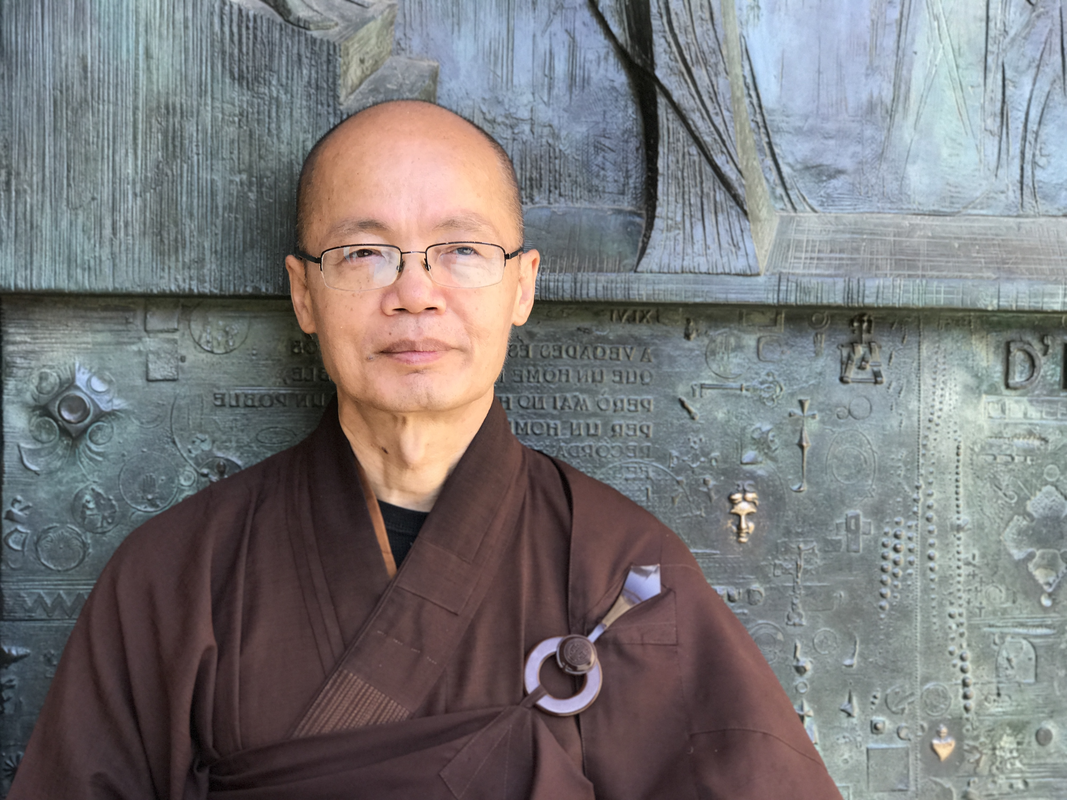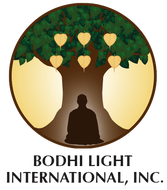 BulkwangMedia article on 04/26/24 YongHua Sunim, who is leading the US WeiYang Lineage, is staying in Korea to meet Korean Buddhists. I met the Sunim at Jeweled Conch Seon Center near Sunae Train Station in Bundang. Upon entering the temple, which is located in a commercial building, I felt that it must be quite difficult for the Sunims to reside there. YongHua Sunim, originally from Vietnam, was once a prominent executive of a large corporation in the US but renounced worldly life after meeting Great Master Hsuan Hua. He practiced Chan (Seon) to the extent of saying, "My first love is Chan," but he also teaches Pure Land Buddhism. The practice of Chan and the Buddha’s Name Recitation Method taught by his teacher, Great Master Hsuan Hua, has become well-known in Korea as well. The words of YongHua Sunim are straightforward. There's no beating around the bush, and he emphasizes efficiency. Whether it's Buddha’s name recitation or Chan cultivation, he stresses the need to solve everyday problems. Is it a matter of cause and condition starting as a businessman and now being a cultivator, or is it an expression of American pragmatism? This question was the central theme of the interview. Rebirth to Ultimate Bliss Pure Land Q: You said, "If one sincerely recites Buddha’s name, he or she can be reborn in the Pure Land." Is that really true? A: It is not only the words of my teacher but also the teachings of Yongming Yanshou, a Chinese Chan master. He started with Chan and attained enlightenment but also taught Pure Land. In China, he was also called the transformation body of Amitabha Buddha. He said, "Anyone who recites Buddha's Name will be reborn in the Pure Land." I believe in these words because they are the teachings of many patriarchs. If you practice Buddha’s name recitation, you can definitely be reborn in the Pure Land. This doesn't mean it will happen in this life, but it is certain for the future. Q: Are you sure about that? A: I believe so. Q: Fear of death sometimes becomes a reason for believing in religion. It is said that at the moment of death, Amitabha Buddha comes to welcome us. Aren't we afraid when facing death? A: Rebirth in the Pure Land is not a simple matter. You need to meet qualifications. If you experience the Buddha Recitation Samadhi, Amitabha Buddha will come to welcome you at the moment of death. That's the door to enter the Pure Land. If you don't attain the Buddha Recitation Samadhi, it's difficult to be reborn in the next life. But didn't Amitabha Buddha make a vow saying, "I will definitely receive those who recite my name into the Pure Land and help them attain the Buddhahood in the future? " Even for those who haven't attained the Buddha Recitation Samadhi, because they "recited Buddha’s name", they can obtain rebirth in the future life. In fact, there are not many people who can talk about what happens after death. One of them is my teacher. Q: What does it mean to attain samadhi? A: Samadhi is an essential element in Buddhist practice and serves as an important measure of disciples' levels of achievement. While the power of wisdom is significant, the power of samadhi is immense as well. Samadhi refers to a state of concentration. When one enters into the state of samadhi, they are less disturbed by external hindrances. Various external factors, such as sounds, smells, and others, do not interfere. Among the disciples of Great Master Hsuan Hua, there was a mathematician who had reached a high level of samadhi. He wrote a paper solving mathematical problems. After the completion, he realized that 17 hours had passed without feeling hunger or thirst. When practicing Chan meditation, one sits quietly. It is a practice to enter a state of samadhi without movement. Additionally, there's moving samadhi in everyday life. Samadhi is achievable in daily life and is very important. Faith, Benefits, and Blessings Q: Cultivation may lead to growth in faith, but there are also doubts and anguish like, “Is this path right?” You emphasize faith in a Good Knowing Advisor, but did doubts arise? A: Doubting about something is a healthy and natural phenomenon. I also had doubts when I met my teacher. However, just as belief isn't someone else's, doubts aren't someone else's either. The first important thing is, “How trustworthy is this person and his story?” You need to know who is teaching you. The second is whether “the teaching resonates with me.” You must agree with it. Lastly, there must be a “response.” Some of my teacher's teachings I couldn't understand. My teacher said to me, "Don't justify yourself." Let's say your closest friend misunderstood you. At that moment, the teacher said, "Don't justify yourself." I couldn't understand it for over ten years, but then finally, a “response” came. “Response” means there's definitely something beneficial when you implement the teachings. That's the teaching of wisdom. While others may speak highly of teaching, and it may seem right logically, what's important is whether it works for me. This is the tradition of Chinese Buddhism. If you want to learn Pure Land and Chan, you must first find a Good Knowing Advisor. To make Buddhism strong, you need responses and such traditions. Q: You also discuss the benefits of cultivation. There's the great benefit of enlightenment, but you also mention worldly benefits like health and blessings, as well as practical benefits. A: Initially, I avoided explaining such benefits. Chan cultivation is noble, and we shouldn't approach it from a business perspective, right? I talked about it continuously for 18 years without a break. But as time passed, the stories repeated, and my disciples got bored. (Laughs) It might seem like I'm talking about worldly benefits, but in reality, it's about listening to people's problems and finding solutions. Some people come because they're depressed, some because of health issues. They bring everyday problems. It's about asking, 'What can Chan cultivation do for me?' Chan solves their problems. Chan can be very practical even in everyday issues, enabling a better life. We talk about Chan's principles and profound teachings, but if there is no benefit to solving ordinary people's everyday problems, how many people will take an interest in Chan? Short Stories A significant amount of time passed with serious discussions, so we tried some lighter stories. YongHua Sunim’s Wei Yang Lineage holds unique cultivation programs like Fo Qi and Chan Qi. The basis of these programs is sitting in a full lotus, which is required for beginners. Q: Is there anyone who doesn’t come to the temple because he or she finds the full lotus position difficult? A: There are many. Too many. (Laughs) Emphasizing the full lotus has its reasons. It's because its efficacy is clear, and it can lead to high levels and quick training. Initially, due to the small size of the temple, it was to select those who could keep up with the training. But now that our scale is increasing, we can't just stick to the full lotus. You're welcome even if you can't do the full lotus. (Laughs) Q: You clearly mention the topic of Mahayana Buddhism. However, nowadays the term “Hinayana” isn't used much, but you clearly make distinction between Mahayana and Hinayana. A: Since there aren't many people, using such terms is still okay. It might be a concern when I become more famous and have more disciples, but for now, it's okay. (Laughs) I'm just talking about what I know. I'm just talking about what I believe in. If I'm afraid of (others' perspectives), then it's not Buddhism. I believe in the teachings of Mahayana and speak accordingly. If I become afraid of speaking, then I'm just trying to please others and gain their support, right? If you want to become famous, that's not cultivation. You should be able to speak about what you believe in. I don't beat around the bush with slightly uncomfortable questions. The format is gentle, but the content is straightforward. Impressions of Korean Buddhism Q: You've been to Korea several times. What are your impressions? A: I've been to Korea a few times. When I first came five years ago, to be honest, I didn't have much of an impression. I felt like I was on vacation. But it was fun. The second time someone asked me to open a temple. "It's very easy, no problem at all. I'll send one disciple," I said. That's how Venerable Xian An came. And I had the opportunity to teach here. After visiting several times, I got a good impression. Korean Buddhism is strong and stable. Although China may not admit it, I've learned that Korean Buddhism is one of the important pillars of Asian Buddhism. I've also met eminent monks. I've seen the tradition of passing on from teacher to disciple. But what I see outside of the traditional structure is more important. Korean Buddhist disciples are talented. With so many talents, why teach only one or two people? Korean Buddhist disciples cultivate with us and reach very high levels. They are truly talented Q: There are many young people at Jewel Conch Seon Center. A: Religion, in general, isn't attracting young people. Korean Buddhism also seems to be getting older. Korean Buddhism is very strong, but it needs change. Young people find it difficult to contribute to the temple because they have nothing. So, they can easily be excluded. But it doesn't matter because we were always poor. (Laughs) Not only young people come here but also many Catholics. I think we can help Korean Buddhism in this regard. A few days after the interview, the Sunim returned to the United States.
0 Comments
|
Questions?Contact Archives
April 2024
Categories |
RELATED LINKS© 2010 – 2023 Chanpureland.org
|
SubscribeJoin our mailing list today!
|

 RSS Feed
RSS Feed